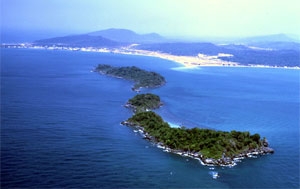Tourism sector priorities sea, island visits
 |
| Phu Quoc areas |
Tuan said that under the sea and island development scheme devised by VNAT for the 2011-2020 period, Vietnam will have five sea tourism areas by 2020, including the Ha Long-Cat Ba area, along with Lang Co-Son Tra-Hoi An, Nha Trang-Cam Ranh, Phan Thiet-Mui Ne and Phu Quoc areas.
Other potential sea tourism areas like Van Don and Co To will be further developed and tours to Truong Sa and Hoang Sa archipelagoes will be tapped, he said at a seminar on a master plan for tourism development until 2020 and vision towards 2030 held in Hanoi on June 16.
Deputy Head of the Tourism Development Research Institute Pham Trung Luong said that the southern central coastal region was expected to record the highest tourism growth and the Central Highlands region through boasting a lot of potential for tourism, having the lowest growth rate.
Climate change will challenge the country’s tourism development, particularly in the Mekong delta, he said.
Under the master plan for tourism development for the 2010-2030 period, Vietnam hoped to raise the number of foreign travellers to the nation from around 10.3 million and a turnover of $19 billion by 2020, to around 18 million and a turnover of $36 billion by 2030.
The tourism sector will prioritise development of northeastern Asia and ASEAN markets, maintain markets in eastern, northern and western Europe and North America, and expand to the Middle East and India .
VNAT reported that the sector welcomed more than 2.5 million foreign arrivals in the first five months of 2011, a year-on-year rise of 18 per cent.
What the stars mean:
★ Poor ★ ★ Promising ★★★ Good ★★★★ Very good ★★★★★ Exceptional
Related Contents
Latest News
More News
- Foreign fruits flood Vietnamese market (December 09, 2025 | 13:22)
- Vietnam’s fruit and vegetable exports reach $7.8 billion in first 11 months (December 05, 2025 | 13:50)
- Vietnam shapes next-generation carbon market (November 26, 2025 | 15:33)
- PM urges Ho Chi Minh City to innovate and remain Vietnam’s economic locomotive (November 26, 2025 | 15:29)
- Experts chart Vietnam's digital finance path: high hopes, high stakes (November 14, 2025 | 10:56)
- Vietnam’s seafood imports surge 30 per cent in first 10 months (November 10, 2025 | 19:35)
- Vietnam’s durian exports hit $1 billion milestone (October 30, 2025 | 17:41)
- Beyond borders: Sunhouse and new era of Vietnamese brands on Amazon (October 28, 2025 | 10:46)
- Record-breaking trade fair set to open in Hanoi (October 15, 2025 | 15:59)
- Timber sector seeks solutions to VAT refunds (October 14, 2025 | 18:58)

 Tag:
Tag:




















 Mobile Version
Mobile Version